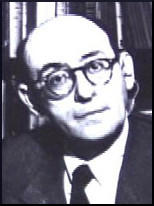Franz Neumann

Franz Neumann was born in Katowice, Silesia, on 23rd May, 1900.
Neumann studied at Frankfurt University and was involved in establishing the Socialist Students Society. He also supported the failed German Revolution in 1919.
Franz Neumann earned a doctorate in 1923 with a thesis on method in the theory of punishment. He joined the Social Democratic Party (SPD) and associated with other left-wing activists such as Julian Gumperz, Paul Massing and Ruth Fischer. He became a lawyer and specialized in defending the interests of trade unionists.
Neumann became a member of what became known as the Frankfurt School. Other members included Georg Lukács, Eric Fromm, Paul Massing, Max Horkheimer, Theodor W. Adorno, Herbert Marcuse, Walter Benjamin, Otto Kirchheimer, Karl Korsch, Leo Löwenthal, Karl August Wittfogel and Friedrich Pollock. It has been argued by Axel Honneth that In the 1920s a number of intellectuals attempted to adapt Marxism to the the theoretical and political needs of the time. "Its work drew on economics, psychology and cultural theory, seeking to analyse from a historical perspective, how a rational organization of society might be achieved... The work of philosopher Walter Benjamin constitutes an analysis of the interrelation of power and the imagination; Franz Neumann and Otto Kirchheimer inquired into legal consensus culture and social control; while Erich Fromm conducted a psychoanalytic investigation of communicative needs and the potential for resistance." (1)
Nazi Germany
Adolf Hitler was made Chancellor of the Reich on 30th January, 1933. The new government immediately suppressed political parties. Hitler now proposed an Enabling Bill that would give him dictatorial powers. Neumann declared "that political justice is the blackest page in the life of the German Republic." (2) Neumann fled to England and studied under Harold Laski at the London School of Economics. He obtained a second doctorate with a study of the rise and fall of the historical epoch of the rule of law.
In 1936 he joined the Institute of Social Research at Columbia University in New York City. (3) During the Second World War Neumann published Behemoth: The Structure and Practice of National Socialism (1942). Ian Kershaw the author of Hitler 1889-1936 (1998) has described the book as "one of the most brilliant contemporary analysts of the Nazi phenomenon." (4) Neumann argued in the book, "Charismatic rule has long been neglected and ridiculed, but apparently it has deep roots and becomes a powerful stimulus once the proper psychological and social conditions are set. The leader's charismatic power is not a mere phantasm - none can doubt that millions believe in it." (5)
Franz Neumann in the OSS
In 1942 Neumann joined the Office of Strategic Services (OSS) as a member of its German section. (6) His friend, Paul Massing, a NKVD spy, reported to Moscow that Neumann had told him that he had produced a study of the Soviet economy for the OSS's Russian Department. (7) In April 1943, Elizabeth Zarubina, a Soviet spy in the United States, and the wife of Vassily Zarubin, met with Neumann: "(Zarubina) met for the first time with (Neumann) who promised to pass us all the data coming through his hands. According to (Neumann), he is getting many copies of reports from American ambassadors... and has access to materials referring to Germany." Neumann's code name was "Ruff".
Franz Neumann promised to cooperate fully during his initial meeting with Zarubina, after becoming a naturalized American citizen later that year he appeared to become reluctant to pass secret information. One memorandum sent to Moscow in early January 1944 described a conversation between Neumann and his friends Paul and Hede Massing, in which they "directly asked him about the reasons for his ability to work" and tried to determine whether he had changed his mind. Neumann responded: "I did not change my mind. If there is something really important, I will inform you without hesitation." (8)
Franz Neumann was killed in a car accident in Visp, Switzerland, on 2nd September, 1954.
Primary Sources
(1) Allen Weinstein, The Hunted Wood: Soviet Espionage in America (1999)
One refugee economist working in the OSS's German section, Franz Neumann, had been recruited initially for Soviet intelligence by Heda Gumperz and her husband, Paul Massing. The couple like Neumann, former socialists in pre-Hitlerian Germany, had begun working for Moscow in the mid-1930s both in Europe and in the United States, broke during the purges, but apparently continued to render modest assistance during the war years.
